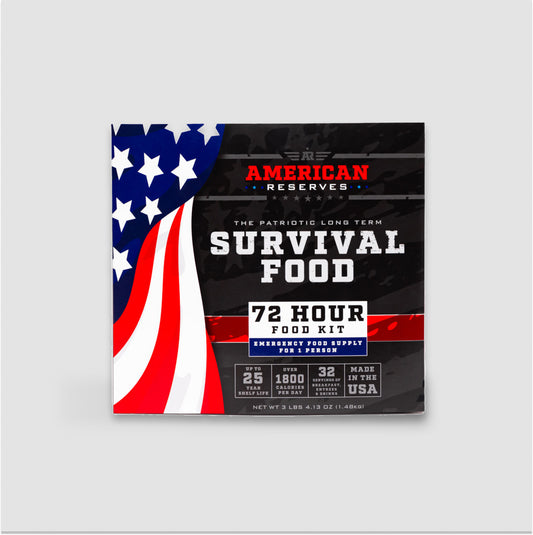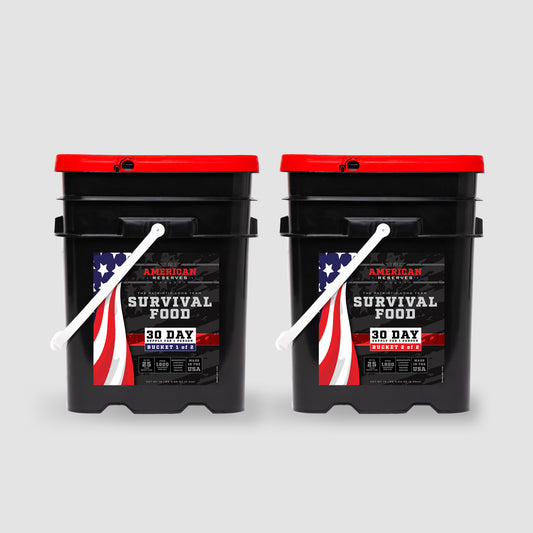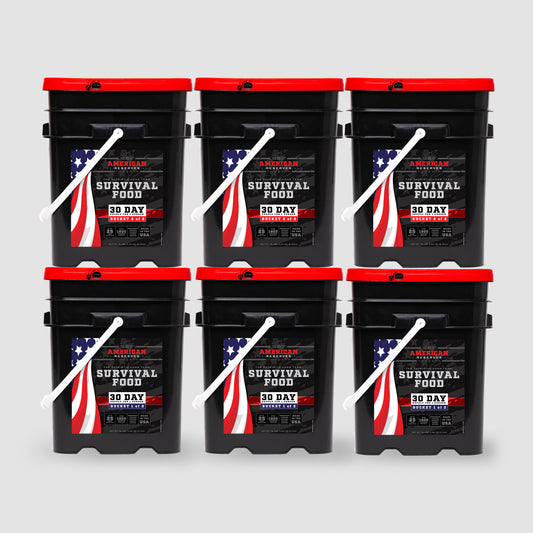
What Is The Best Way To Prepare Food In a Survival Situation?
In the face of unexpected emergencies, knowing what is the best way to prepare food in a survival situation can be the difference between thriving and merely surviving. Mastering food preparation techniques is essential for those passionate about self-reliance and preparedness. This guide delves into practical, reliable methods to ensure you and your loved ones remain nourished and secure, no matter the circumstances. By embracing these strategies, you can build confidence and resilience, ready to tackle any challenge that comes your way.
Why Knowing How To Prepare Food In a Survival Situation Matters
Maintaining the welfare and safety of oneself and loved ones during an emergency depends on knowing how to cook meals in a survival scenario. Proper cooking provides vital nutrients to keep energy and health intact as well as increases mental resilience and morale in trying circumstances. It reduces the danger of foodborne infections, which can be harmful when medical resources are limited. Moreover, developing these abilities helps one to become self-reliant and confident, enabling people to meet unanticipated events with readiness and assurance. One can greatly improve their chances of surviving in any kind of environment by giving food preparation knowledge top priority.
What Is The Best Way To Prepare Food In a Survival Situation?
Assess Your Resources and Environment
Begin by evaluating the available resources and the environment you are in. Identify accessible food sources, water supply, and potential cooking methods. Understanding your surroundings will help you make informed decisions about food preparation.
Prioritize Food Safety
Ensure that all food is handled safely to prevent contamination. Wash hands and utensils with clean water, and keep raw and cooked foods separate. If possible, boil water to purify it before use. Store perishable items in a cool, shaded area to slow down spoilage and maintain freshness.
Choose Efficient Cooking Methods
Select cooking methods that are efficient and suitable for your situation, whether it's using a portable stove, building a fire, or utilizing solar cookers. Options include using a portable stove, building a campfire, or utilizing solar cookers. Each method has its advantages depending on the resources and time available.
Utilize Nutrient-Rich Ingredients
Focus on preparing meals that are rich in essential nutrients to maintain energy and health. Incorporate a balance of proteins, carbohydrates, and fats, and include foraged foods like wild plants and berries if safe and available. Emergency food kits are a key resource, providing a reliable supply of nutrient-dense meals that are easy to prepare and store, ensuring you have access to essential nutrition even when other food sources are scarce.
Practice Portion Control
Ration food carefully to ensure it lasts for the duration of the survival situation. Plan meals to avoid waste and ensure everyone gets an adequate share of nutrition. Monitor consumption regularly and adjust portions as needed to stretch supplies and maintain balanced nutrition.
Preserve Leftovers
If you have leftovers, preserve them using methods like drying, smoking, or salting to extend their shelf life. Properly stored leftovers can provide additional meals and reduce the need for constant food preparation. Ensure that preserved foods are kept in airtight containers to prevent contamination and spoilage.
Stay Adaptable
Be prepared to adapt your food preparation techniques as circumstances change. Flexibility is key in survival situations, so be ready to modify your approach based on new challenges or resources that become available.
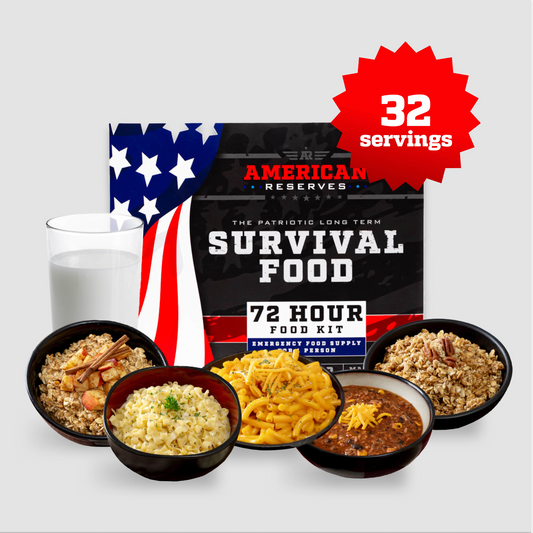
72 Hour Emergency Food and Drink Supply - 32 Servings
$36.99
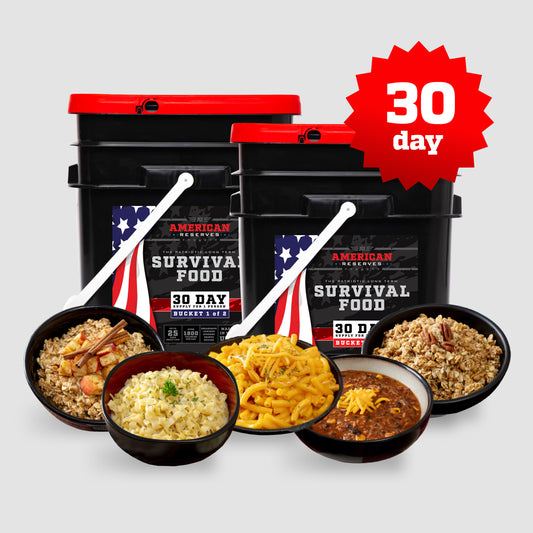
30 Day Emergency Food Supply
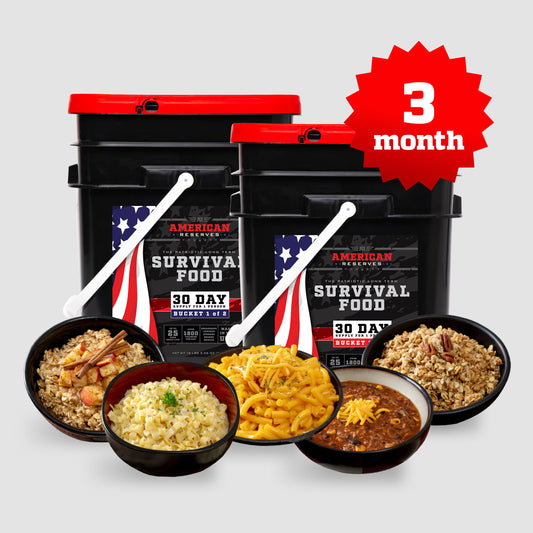
3 Month Emergency Food Supply
$835.00
What Type Of Protein Is Best To Prepare In a Survival Situation?
In a survival situation, the best type of protein to prepare is one that is both readily available and easy to store. Lean meats such as fish, poultry, and game are excellent sources of high-quality protein and can often be found in the wilderness. Additionally, dried or canned beans, lentils, and legumes offer plant-based protein options that are lightweight and have a long shelf life. Emergency food kits often include freeze-dried meats and protein bars, which are convenient and require minimal preparation. Foraging for edible insects can also provide a significant protein boost. Ultimately, the ideal protein source will depend on the resources at hand, but prioritizing options that are nutrient-dense, easy to store, and simple to prepare will ensure sustained energy and health.
Are Insects Safe To Eat In a Survival Situation?
Insects can be a safe and valuable source of nutrition in a survival situation, provided they are correctly identified and prepared. Many insects, such as crickets, grasshoppers, and mealworms, are rich in protein, fats, vitamins, and minerals, making them an excellent supplement to your diet when other food sources are scarce. However, it is crucial to avoid brightly colored or strong-smelling insects, as these characteristics often indicate toxicity. Always cook insects thoroughly to kill any potential parasites or pathogens. By exercising caution and proper preparation, insects can be a reliable and nutritious food source in emergency scenarios.
Cooking and Survival Techniques In Survival Situations
- Building a Safe Fire: Learn how to construct a fire pit and safely ignite a fire using available materials like dry wood, leaves, and kindling. Master campfire cooking techniques to prepare meals directly over the flames or using hot coals.
- Using Portable Stoves: Invest in a reliable portable stove that can be fueled by propane, butane, or other readily available fuels. Ensure you have an adequate supply of fuel and understand how to operate the stove safely and efficiently.
- Solar Cooking: Utilize solar cookers to harness the sun's energy for cooking, which is especially useful in sunny environments. Experiment with different solar cooker designs to find the most effective one for your needs.
- Boiling Water: Always boil water to purify it before use to eliminate harmful pathogens and ensure it is safe for consumption. Boil water for at least one minute to ensure it reaches a temperature that kills bacteria and viruses.
- Foraging for Food: Identify and collect edible plants, berries, and insects to supplement your food supply. Learn to distinguish between safe and toxic plants to avoid accidental poisoning.
- Fishing and Trapping: Use simple fishing lines, traps, and snares to catch fish and small game for a reliable protein source. Regularly check and maintain your traps to increase your chances of a successful catch.
- Preserving Food: Employ methods like drying, smoking, and salting to extend the shelf life of food and prevent spoilage. Store preserved foods in airtight containers to protect them from moisture and pests.
- Cooking with Minimal Tools: Master techniques for cooking with basic tools like pots, pans, and makeshift utensils crafted from natural materials. Practice building and maintaining a fire to cook effectively with minimal equipment.
- Rationing Supplies: Carefully manage and ration your food supplies to ensure they last for the duration of the survival situation. Keep a detailed log of your inventory to monitor consumption and plan for resupply.
- Improvising Cooking Methods: Be adaptable and creative in your cooking methods, using available resources and materials to prepare meals efficiently. Experiment with different techniques to find the most effective ways to cook with limited resources.
What If I Have Limited Resources in a Survival Situation?
If faced with limited resources in a survival situation, prioritizing and maximizing what is available becomes essential. Focus on basic needs such as clean water, food, and shelter. Utilize natural resources efficiently by foraging for edible plants, insects, and small game. Employ simple yet effective cooking methods like campfire cooking or using makeshift solar cookers. Ration food supplies carefully to ensure they last as long as possible, including emergency rations, and preserve any excess through drying or smoking. Creativity and adaptability are key; use available materials to craft tools and utensils, and remain flexible in your approach to problem-solving. By staying resourceful and maintaining a positive mindset, you can effectively navigate the challenges of limited resources and enhance your chances of survival.
Conclusion
In conclusion, mastering the best ways to prepare food in a survival situation is a vital skill that can significantly enhance one's ability to thrive during emergencies. By understanding and implementing efficient cooking methods, prioritizing food safety, and utilizing available resources wisely, individuals can ensure they and their families remain nourished and healthy. Embracing these techniques not only fosters self-reliance and confidence but also prepares one to face unforeseen challenges with resilience and assurance. As part of a broader preparedness strategy, these skills contribute to a sense of security and readiness, empowering individuals to handle any survival scenario with competence and optimism.
Final Thoughts
At American Reserves, expertise in emergency and survival is our hallmark. Our emergency food supply kits are crafted from the finest locally sourced ingredients in the USA, ensuring you have the essential nutrition needed in dire circumstances. Trust American Reserves to keep you prepared for any situation.
Sources
